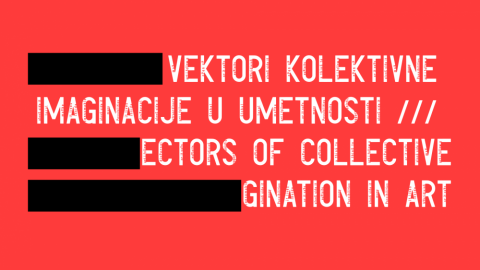PUBLIC CONVERSATION: ART GROUPS AND SOCIO-POLITICAL ENGAGEMENT, Saturday 18.07.2020. at 7PM CET

PUBLIC CONVERSATION: ART GROUPS AND SOCIO-POLITICAL ENGAGEMENT
SATURDAY 18.07.2020. at 7PM CET
Art Groups and Socio-Political Engagement
Speakers: Vida Knežević (SR) and Jacopo Galimberti (I)
Moderation: Ana Vilenica and Darija Medić
The conversation series Vectors of Collective Imagination in Arts will be conducted through the Zoom platform, within which the audience will have the opportunity to actively participate through a chat discussion.
Join Zoom Webinar: https://us02web.zoom.us/j/87968491581
Meeting ID: 87968491581
You will also be able to follow the conversation via live streaming on the kuda.org youtube channel.
In the conversation to follow, also called Art Groups and Socio-Political Engagement, we will discuss links between art groups and leftist movements, organisations and political parties before World War II and during the 1960s, as well as issues about political organising in art. Vida Knežević, an art historian from Belgrade, will talk about the illegal group Life (Život), active in the period between the two World Wars in the Kingdom of Yugoslavia, which was part of a revolutionary movement organised by the Communist Party of Yugoslavia. Jacopo Galimberti, an art historian from Italy, will focus on the work of Group N, which developed its collective artistic practice during the 1960s in the intellectual-political context of innovative Marxist thinkers – the operaista movement. Group N was simultaneously engaged with the New Tendencies - an international movement in art that gravitated around the Zagreb Gallery of Contemporary Art between 1961 and 1973.
The conversation series Vectors of Collective Imagination in Art is a space for discussion about self-organised art groups, ad-hoc and mythical-real collectives, as well as artistic infrastructures for the collective production of knowledge and the struggle for commons. The series consists of three conversations that will deal with the political economy of art collectives, socio-political engagement of art groups, as well as imagining the anti-systemic collective practices in the period before World War II, during the socialist experiment in Yugoslavia, the anti-Yugoslav period of the 1990s. and the present situation.
Vida Knežević is an art historian, curator, cultural worker, member of Kontekst collective whose work is based on a process of connecting critical theory and practice, the field of arts and culture with wider social and political effects. From 2006 to 2010, she was working on the Kontekst Gallery project. From 2008 till 2010 she was teaching at the Advanced Vocational Studies School of Fine and Applied Arts in Belgrade. In 2008 she completed her MA studies at the Department of Art and Media Theory of the University of Arts in Belgrade, and in 2019. she completed her PhD thesis entitled „Theory and Practice of the Critical Left in Yugoslav Culture (Yugoslav Art Between the Two World Wars and the Revolutionary Social Movement)”. Since 2014 on, she has been one of the editors of the educational project and the left online magazine Masina.rs, where she deals with the relationship between cultural, art and media production, economy, politics and activism.
Jacopo Galimberti is a postdoctoral Fellow at the University of Bologna. He has published extensively on the connections between art and politics in the twentieth century, in journals such as Grey Room, The Oxford Art Journal, Art Bulletin, and Histoire de l’Art among others. He is the author of Individuals against Individualism. Art Collectives in Western Europe (1956-1969) (Liverpool University Press, 2017), and co-editor of Art, Global Maoism and the Chinese Cultural Revolution (Manchester University Press, 2019).
Concept and moderation: Ana Vilenica is a housing activist, a researcher and theoretician of social movements, urban changes, housing and art.
Chat moderation and technical support: Darija Medić is a digital practitioner and educator, researching the field of identity correction//building and labyrinths of contemporary technical practices through the poetics of language, technology and art.
Conversations Vectors of collective imagination in art are part of the project Art Organisation - a long-term international research project that deals with the analysis of artistic (self)organisation in the (post)Yugoslav region. The focus of this project is on self-organised art initiatives outside the mainstream. The project covers a wide historical field from Surrealism in the 1930s to the present day. During 2017, our work on the project began with interviewing participants and protagonists of the contemporary art scene in Yugoslavia. This work continues in 2018 and 2019, when interviewees were theoreticians and art historians, as well as artists who had realised their practice through group art work. The result of this research is an archive consisting of interviews, documentation of works of art and critical texts written during the project trough the program Fragments for studies on art organisations. In July, simultaneously with the series of talks, a collaborative research working group will meet online to analyse and review the materials created during the project. This working group will create a space for collective critical rewriting of the art history of the (post)Yugoslav cultural space and critical work with the generated archive. The online format of the upcoming events and sessions was selected due to the changed circumstances that arose during the COVID-19 pandemic and represents a kind of a challenge for all those involved in this process.
Art Organisation is part of a wider project Vectors of Collective Imagination where kuda.org cooperates with partners: Multimedia Institute mi2 and Kulturtreger-Books, Zagreb (HR); Glänta Gothenburg (SE); Kontrapunkt, Skopje (MK) and Berliner Gazette, Berlin (DE).
The project is supported by the European Commission through the Creative Europe program from September 2018 till September 2020, with the support of the FFAIART Foundation for Art Initiatives and local program support of the Ministry of Culture and Information of the Republic of Serbia and the City of Novi Sad.
